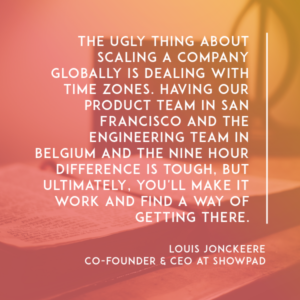Who wouldn’t want to “take over the world” by expanding globally? As exciting as it can be to have customers and offices across the pond, you have to be mindful of the many differences between countries and the complexities that come along with creating an international business.
Christoph Janz, Managing Partner at Point Nine Capital, is joined by Nicholas Deassaigne, co-founder and CEO at Algolia; Matt Price, SVP of Global Marketing at Zendesk; and Louis Jonckheere, co-founder and co-CEO of Showpad, to discuss the highs and lows of building a global company and what you should do to minimize the headaches associated with it.
Learn about how American interviewees are quite the showoffs whereas Europeans tend to downplay their skills, why time zones can be a nightmare (though not impossible) to deal with, and how selling to European customers is different from selling to Americans.
Check out the full transcript below!
If you want to see more sessions from 2016, we’re releasing a new one each week. Subscribe here to be notified. And be sure to grab your tickets to the 2017 Annual NOW.
TRANSCRIPT
Christoph: Thank you, Jason. This is going to be the leading panel in terms of funny names and funny accents, including mine. Thanks for staying. I was about to say that this is the last panel, which is standing between you and the drinks, but I think it’s actually wrong because Jason has opened up the bar at 8:00 AM already.
Christoph: I’m Christoph Janz, I am of Point Nine Capital. We’re an early stage VC based in Berlin. We invest primarily in European SaaS startups, such as Algolia. What that means is that the startups that we invest in have to think globally almost from day one, because their local markets just aren’t that big.
I think eventually all SaaS companies need to think globally, but the European ones or the ones outside of US just are forced to do it a bit earlier. It’s a topic which is very close to my heart. I think it’s also a topic, which is very interesting for many of you, because I know that this conference has attracted people from many, many countries around the world.
I’m very happy to discuss this topic with three people who are very knowledgeable and have a very unique perspective about this, Nicolas from Algolia, founder and CEO of Algolia a Search as a Service solution founded in Paris, now has a significant operation here. Algolia, Nicolas can probably explain it better, allows anybody to add a Google-like search experience to a mobile app.
Then here is Louis, the co-founder and co-CEO of Showpad, founded in Belgium and now also based here in the Bay area. Showpad, correct me if I’m not putting it very right, is a sales enablement solution, which allows you to get better at content marketing and messaging.
Finally Matt Price, one of the early employees at Zendesk, which probably most of you in the room know. He built up Zendesk in Europe and in other countries, and is now leading the global marketing for Zendesk, and has few other responsibilities at the companies, which he can talk about.
Maybe my first question goes to Nicolas. When you founded Algolia a few years ago back in France, was it clear to you from day one that you have to move to the US, that this is eventually going to become a US-based company? Or is it something that you realized over time?
Nicolas Dessaigne: Yes. I would say that, from day one we already knew that our market was global. We’re selling a developer tool. Developers are pretty much similar everywhere in the world. For us, it was very clear that the market was global and the biggest market for tech products is the US. Yes, I would say, yes, we already knew at first that we would need to come to the US.
Christoph: Yeah. How about you?
Louis Jonckheere: Yeah, a pretty similar story. We realized as of day one that the bigger market was the US. We sell to companies with sales teams, which you’ll find more here but we made a very clear decision to build the product initially in Belgium, try to find product market fits and only after a few hundred thousands of dollars in Euro, we made the move the US. That’s a very important decision we made here.
Christoph: Matt, I think you joined Zendesk at a time when the team had already moved over to the US and then they came back to, in a way, to Europe. Can you maybe talk a bit about that that experience.
Matt Price: Zendesk obviously was founded by the three founders. The three founders came over to the US and actually built a business, got the first 10,000 customers without actually having to have anybody outside of the business.
At that point in time we realized that it might be useful to have some people on the ground in the market, so started more of a global expansion in places from that point.
Christoph: You hired a lot of people out of the London office, and you’re also working very closely with a team here in the US now. You have the perspective from both sides of the ocean. What would you say are some of the difference that you have to keep in mind and maybe some advice for founders?
When you hire people here, are the interview questions or processes different? Any advice for people who would want to build a team in Europe or in the US?
Matt: Yeah, I am. Firstly there’s just the practical thing of interviewing people. I think Nicolas [inaudible 06:38] wrote about this in his book.
There’s actually a Danish phrase for this. I apologize to any of the Danes out there. I’m just about to crucify your language but they call it [Danish word], which is understatedness, which I think is to some extent very much a part of the Danish culture, to some extent part of the European culture. It’s probably not part of the culture for people in the US who are interviewing.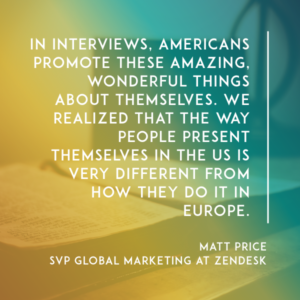
What we did was, when we first started interviewing people, they would come up and they’d take these amazingly wonderful things about themselves and really promote them. We’d just think, “Well, compared to a European guy, these guys must be absolutely amazingly awesome.”
Then realizing that the way people present and promote themselves is very different from within Europe and the country works as well. When interviewing people within different European countries, they’re likely to present themselves in different ways.
Just assessing people and understanding that from a cultural basis can be difficult, so bringing into your interview panel as much as possible a trusted advisor from that particular nationality would be pretty handy.
Louis: I would agree. The failure rates as a startup when hiring people in the US is a bit bigger compared to Europe. In the US people sell themselves better, especially if you’re hiring salespeople and marketers, while in Europe and Belgium they’re a bit less selling. They’re a bit more honest. They’re a bit more integrant, and that makes less mistakes.
We had a ton of people we hired in the beginning, which we let go after a few months because we made a lot of mistakes in that.
Christoph: Is that your experience as well, Nicolas?
Nicolas: It’s a very, very similar experience. I would also say that as a European founder wanting to hire in the US, I think it’s very important that one of the founders come to the US or maybe bring an early employee. What we realized, our very first US employees are no more with us because none of the founders were there yet.
You need to be here to really go for those… first appearance Americans usually are very, very good at selling themselves. We need to learn the cultural things. We need to better understand all of that before.
Christoph: Do you think that you can avoid that mistake as a European founder who wants to set up shop here, or is it basically a lesson which everybody has to make, making a few bad hires, being oversold by some of the great salespeople in the US? Can you avoid it somehow?
Louis: Literally, our investor from Europe, told us, “Look. You’re going to hire people which you will fire after three to six months.” We didn’t believe him. It happened, people warn you, but still you make that mistake. I think it’s something you will have to go through as you being the founder.
Matt: We found their techniques, and we still use these today, as to how to engage that and scratch below the surface of how people operate. Do your usual rounds of interviews.
One of our favorite things is to ask the person to come in and actually run a workshop internally, and actually put a mixed panel of people within the room right from a very junior person to a senior person and understand how they engage and work within that group.
That helps us understand a little bit when we’re evaluating people on a couple of criteria, firstly on their skills. Secondly, we call it the eye of the tiger, which is, have they got that cultural fit that we could work on?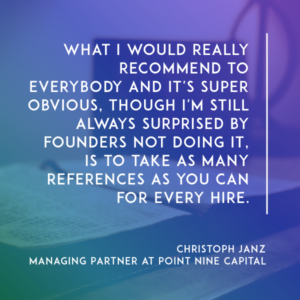
Christoph: What I would really recommend to everybody and it’s super obvious, but I’m still always surprised often about founders not doing is just to take references for every hire as many as possible, backdoor references, to talk to as many people as possible. Each one adds a little bit of a data point which will then, maybe hopefully, allow people to avoid some of those pretty costly mistakes.
Switching topics a bit from hiring to customer acquisition, do you find any differences when you talk to customers in Europe versus the US, or other countries? I think the cliche, or maybe not the cliche, is that American customers are more open to innovation, they are easier to sell. European customers care more about security, maybe have general concerns around cloud adoption, in general.
Is that a myth or is it something which you can really see when you talk to European customers than the American ones?
Matt: It really depends on the demographic or the market sector you’re selling into. When we were starting, we saw no notable difference in adoption across different markets in effect. It may well be because it was very much a product driven and an online driven market.
In fact, after I’d been on board for about a year, we actually did an analysis of our penetration into different European markets so we could take the gross domestic product of a country in our penetration. Then we came up with some kind of penetration index.
That’s pretty interesting. We’re lot more penetrated to certain markets than others, and can we correlate that? It was almost already proportionate today, the amount of English that was spoken within that market. What we really took away from those, actually the model was very flat for us, within this.
We focused very much on optimizing that model than optimizing for the market. Obviously, the next step for that was…the next step on penetration was language. As we started to move up market, then things like security. As soon as lawyers are going to be involved in deals, then we have to deal with things like security, and aspects like that.
Christoph: How about you, Nicolas, did you see any difference dealing with European customers and customers here?
[crosstalk]
Nicolas: Definitely, but not always the obvious security. I would say also the homogeneity of the market is a big, big advantage of US. From day one, when we started to sell the product, most of our customers were coming from the US, even if we were still based in Paris, and still today, 60 percent of our customers are from US.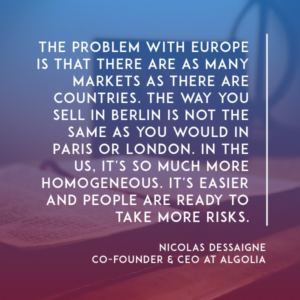
The problem with Europe is that it’s as many markets as you have countries, so it’s very fragmented. The way to sell in Berlin is not the same as in Paris or London. You need to learn the local culture. In US, it’s so much more homogeneous, it’s easier, and people would also be ready to take more risks, like earlier adopters of technologies, that is also in here.
Christoph: Louis, have you seen any differences?
Louis: Yeah. I echo what Nicolas was talking about. In US, they’re a bit more educated to take a bit more risk. Like he’s mentioned, Europe really doesn’t exist as a market. Selling into Germany is so different than selling into the UK. France is different. Spain is different. If you want to scale in Europe, it’s pretty hard to do it in from an office, you need to have people on the ground understanding the language, understanding the different practices.
It’s not that easy of thinking Europe as being like the US, one continent, one language, one way of selling it. It’s totally different.
Christoph: Taking a step back…One or two more questions from myself, and then I want to give the audience a chance to chime in. Do you think it was the right thing to do, to move to the US? Follow up question to that, do think it would still be the right thing for a founder who faces the decision today, maybe in a different market environment?
Nicolas: Yes, it was a good thing. It really helped us to also be identified as a global company, that would have been so much more difficult to do from just Paris. That said, keeping our office in Paris for engineering was also a very good thing.
It was extremely challenging and still challenging around communication, time zone, all of that, but it’s also a huge competitive advantage because we can find extremely great developers in Paris, that we would be never be able to hire here. I would say it’s the best of both worlds, having your HQ in San Francisco, and your engineering team in Europe.
Today, would I do the same thing? Yes. I would probably avoid some of the legal hassle and start directly the company in US. But I would still think about building a team in Paris, maybe not as soon, not as the first team. I don’t know, it’s difficult to know what you would do without doing it, but yes, it’s still worth it.
Christoph: How about you, Louis?
Louis: Yeah, for sure. When we moved to the US, the number one reason was talents.
Again, in Europe, it’s relatively easy to find great engineers, good salespeople, and engineering leader, but if you want to have that VP Sales or VP Marketing, for example that’s scaled the DemandGen engine from 100 MQLs to 100,000 MQLs, in a few years, or if you want to have that VP Sales who’s scaled from 5 reps to perhaps 200 reps in a few years in SaaS, it’s impossible to find in Europe.
Those are the people you need to scale your business. That was the number one reason, talent. The number two reason was access to capital, but I think that’s very strongly changing in Europe. Four, five years ago, it was tough to raise 20, 30, 40 million. That’s becoming very doable. That, as well.
The third reason is the ecosystem, the partners. We live in a world of sales and marketing, so we have Salesforce across the street, Marketo a few blocks down, and we need to be wherever ecosystem is. For sure, definitely, we would do it again.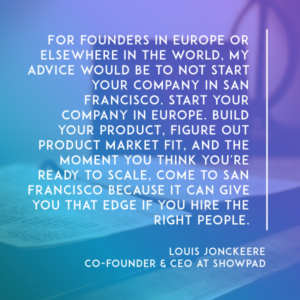
As an advice for European founders or founders elsewhere in the world, my advice would be, don’t start your company in San Francisco. Start your company in Europe. Build your product, do a product market fit, and the moment you think you’re ready to scale, come to San Francisco, because it can give you that edge if you hire the right people.
Christoph: Makes sense. I do have a bunch of other questions, but I want to give the people over there a chance to ask their questions, as well.
Tom Coffin: Hi. My name is Tom Coffin, from Simply Reliable. We have a SaaS product for trade folks, your custom installers, your electricians to run their business, stuff like that. Europeans, Australians, and people from Abu Dhabi, all over the world find us, and they use our app, our product actually.
One of the things that’s starting to concern us is the whole issue of VAT. We don’t charge tax for this, they just buy it. We’re really not doing business in their country, so to speak. Can you talk to the VAT concern from an American company doing business over there?
Nicolas: No.
[laughter]
Christoph: All right, thank you and goodnight.
Louis: I can refer you to somebody who knows about that. [laughs]
Nicolas: In our case, we have actually kept the two legal structure. We charge European customers from France, so we deal with VAT in France from a French company with Europe.
Tom: Do you charge those customers tax?
Nicolas: We are B2B. The very nice thing with B2B is that you don’t need to charge VAT outside your own country, so we charge VAT in France but not for other European countries. We don’t need to. There is an exception to the rule, which doesn’t work for consumer goods.
Tom: Is that throughout Europe?
Nicolas: Throughout Europe, yeah.
Louis: The exact same thing with us, just like Nicolas.
Luis: Hi, my name is Luis. Can you talk a little bit about how do you scale the culture globally as you have different offices in different countries, particularly if those offices have very different functions? For example, you have an engineering office in Europe and then an American office is all sales and marketing.
Louis: That’s tough. The ugly thing about scaling a company globally is the time zones, the fact that you have to figure out where do you want to put your people. For example, we have our product team in San Francisco, the engineering team in Belgium, nine hours difference. It’s tough, but ultimately, you’ll make it work, and you’ll find a way of getting there.
As a founder, you have to do everything to enable your company to collaborate globally. I would say the biggest thing you should never save on are travel costs. People who work here at Showpad can then stay for three months in San Francisco or Belgium. We bring the team together every single year.
Try to make it a real company. Try to make sure that people see each other in real life, and make it a part of your culture.
Matt: To add on to that, we found there were some real anchors that could bring disparate offices together. The one thing that actually surprised me on this was our CSR program on that and just something that got rolled out and was an identity for the whole organization.
When we like to culture, it then became an anchor for our culture within the actual organization, too.
Nicolas: The best answer is the culture. The way you build the culture is going to help you to handle to distance. Because of the distance, you want to over communicate, so you want a lot of transparency. Everyone needs to know as much as possible so they can make their own decisions locally without having to communicate too much.
Then, travel a lot. We encourage everyone to travel at least once a year to the other office, if not many more times depending of the needs. We do have corporate apartments in Paris or in SF to house them.
Maybe their language. One thing we did pretty well at the beginning is that we started to hire non-French people in Paris, and that forced us to speak only English, even in Paris, and that’s very useful tool. You have only one language for the company.
Christoph: Is that legally allowed in France?
[laughter]
Nicolas: Who cares?
Christoph: I’m just kidding.
Anthony Marnell: Anthony Marnell from Trello here. Just a question for those that came from Europe to the US, and even for Christoph if you have any thoughts here, what would you say to a company that’s looking to expand to the US?
How much cash should you be setting aside for that investment to actually do it right? What would you recommend to your portfolio companies?
Nicolas: Do I start? We have not really planned it with cash in mind. We did it very progressively. We started in Europe. I moved to the US in July, like seven months ago. Before that time, we already had 60 percent of our customers in US. We didn’t come here to open the market. The market was already there. We came here to scale faster.
At that time, it was no more a question of money. We had raised enough money to be able to do that. It was not an issue. I’m not able to answer more precisely, but Christoph, always.
Christoph: I think it obviously depends on factors like how many people do you want to move over? Is it the founder who just moves here, sleeps and works from his cheap Airbnb apartment?
In theory, it doesn’t have to be that expensive, but I think it’s generally very hard if you don’t have some kind of anchor here, which can be either a great local investor, or maybe you go through an accelerator like Algolia, which went through Y Combinator.
If you’re just setting up shop here, maybe you can do it on the cheap, but I think it’ll be really, really hard and probably take you a year until you’ve built a network which allows you to hire actually good people and not just those people who didn’t get a job at a US-based, native company.
Louis: We moved to the US the moment we raised about two million, so we made that exercise a little bit. How much money did we want to bet on the US? For us, it was about a million. Hire three sales reps and an SER, that’s half a million. Hire one customer success coach, another 150. A founder’s salary, the office. Pretty quickly, you’ll be at a million.
That’s what we gave it as a try, and it worked.
Nicolas: Really, you can start selling in US without having an office. Just hustle your way. You can travel back and forth. You can come half your time here and start selling before hiring people.
Audience Member: I have a question related to pricing, because the buying power of $10 in US have different equivalency of local currency in different countries like in Germany, or Czech Republic, or whatever. How to think about this when it comes to scaling from US to Europe or from Europe to US?
If you’re in Europe, you can charge more money from your customers if you expand to US, but at the same time, if it’s one brand, it’s easy to find out that you’re actually about to charge them more, so how to address this issue?
Matt: We, for the longest time, just charged in US dollars. When we tested across different markets and different prices, didn’t really see any meaningful changes in price in each of the different local markets. We’ve since deployed in local currency, as well. Again, haven’t seen anything super meaningful in the actual change on that, as well.
I think we went into it thinking, actually, localizing our pricing both on the currency and also the pricing is going to make a significant difference, and we didn’t see much at all within the market.
Audience Member: Follow up question. The capacity of the market, let’s say that your target to the people which are willing to pay for the service up to $10, so the amount of people in Germany which are willing to pay this amount is less, is smaller, than the amount of people which are willing to pay in the US.
Having the same pricing may result in having smaller amount of customers in other countries. Is there any solution for that? You just need to deal with that and accept that because of the same pricing in every country, we just about to have fewer customers, right?
Matt: I don’t think we ever saw it as the price point was limiting the market size. We just ended up not necessarily thinking of price was a friction point, at least within our business on B2B, but there are other friction points we should address beyond that such as product localization, availability of local language support, and so on and so forth.
I don’t know if the other guys have a perspective on it.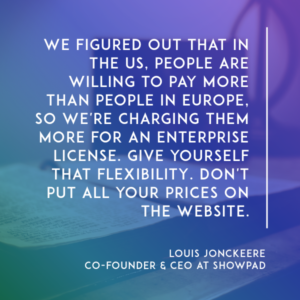
Louis: A big tip would also be, for example, our enterprise product doesn’t have any pricing on the website, so experiment with it. We figured out that in the US, they’re willing to pay more than in Europe, so we’re charging more for an enterprise license in the US versus Europe.
Give yourself that flexibility. Don’t put all your prices on a website. I think that’s a good point to start.
Audience Member: I have a different type of question, actually. As an American-based company wanting to expand in Europe, we have somebody from the UK, from Belgium, from France. What would be the first location that you would suggest to look at?
Nicolas: Paris, of course.
Christoph: France, Belgium, UK, Germany. [laughs]
Audience Member: Well, I only need one.
Matt: Our experience is actually not necessarily think about country. Depending on who you want to hire, set up in somewhere where people want to live and locate. The hiring pool in any country is going to be…What we did, we set up in London. London is a really interesting place. I think half of my team relocated.
My Dutch sales guy relocated to London, my French sales guy initially. Really focusing on that, building a community, and drawing those in is probably the best thing that we did, in retrospect, on that.
Christoph: If you want to avoid the complexity of an additional language, then the UK is obviously the place to go. Germany, and Berlin, and maybe also Paris, and other cities, Barcelona, I think are great places to attract people from all over Europe. It depends on some of these factors.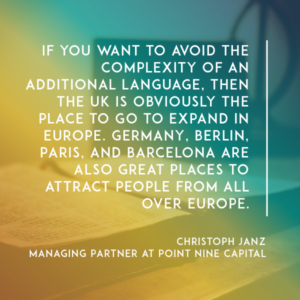
Nicolas: The thing is you are going to need local people to sell in every country, so you need to choose a city where people will enjoy going, so London, Berlin, Paris, all are good candidates.
Matt: One thing we did discover by accident was useful for London is that you can set up very tax beneficial employee share plans, sub plans from the US plans that qualify for entrepreneur relief. You can be a lot more cost effective in your share distributions by taking advantage of that.
Christoph: I think we have time for one last quick question.
Audience Member: Here, hi. I actually have similar challenge. I’m French, based here in the US, and we work for an American company trying to expand in Europe. And I’ve seen the good, bad, and ugly, also, when American companies want to go tackle that market.
What do you think are the biggest mistakes that you’ve seen of companies trying to expand globally, and settle, and expand, and grow in Europe and European markets? First of all, they think it’s one big market versus multiple ones.
But what would you advise a company who wanted to expand there?
Christoph: I think that’s a great final question, because the name of this panel is the good, bad, and the ugly about global building and scaling, so maybe each of you can come up with one good thing, or bad thing, or maybe even an ugly thing to give some advice to people like you?
Louis: To relate to your question, I think what you shouldn’t be doing in the US is just copy all the processes that work here and think that they will work in Europe, because they won’t. Every country deserves a specific approach. That’s what we learned. That’s what, also, people who worked with Showpad have experienced in the past.
The ugly thing about scaling a company globally is definitely the time zone difference, that’s tough. Being nine hours separate from your leadership team, the engineers is something you have to work on, so that’s for sure your ugly.
Matt: I would agree on the processes. When hiring people, the point we came to expansion, the US organizations recently matured. For example, in sales we had pre sales people, we had SDRs, we had customer account managers.
Trying to replicate that model too early within a local market was too soon. What we wanted to do was to hire mini CMOs or mini territory managers who are real athletes within that market. Almost resetting and thinking differently about the hiring profile.
What that meant then was maybe thinking about spending more on some of those initial hires. When we benchmark salaries within US, having an early discussion with the CFO on the fact that when we’re pioneering in a certain place, we probably need to up the ante.
Having that discussion when we’re setting up the role, not at salary negotiation with the person we’re going to bring on board.
Christoph: Any final words on the good, the bad, the ugly stuff?
Nicolas: I would say be very careful, very aware of the cultural differences because it’s so difficult to realize that people in Europe will not react the same way as people here. I would even say depending on the country in Europe, it will be different.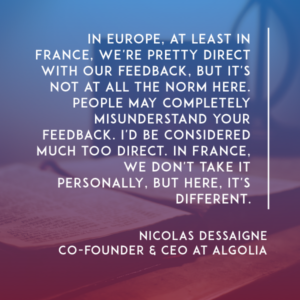
Like, for example, in Europe, at least in France, we’re pretty direct in our feedback, where it’s not at all the norm here. People may completely misunderstand your feedback because they would think you think…I don’t know, I would be, myself, much too direct. In France, we don’t take it personally, it’s normal.
Here, you for one, challenging feedback, you need to give three positive ones. It’s not in our culture, I think you get the same problem on the other way and probably across countries in Europe too. That’s one of the most challenging part of scaling globally. You need to get to know individual cultures, how they work, how they communicate, that’s tough.
Christoph: Thank you very much, guys.
Matt: Thank you.
Nicolas: Thank you.

